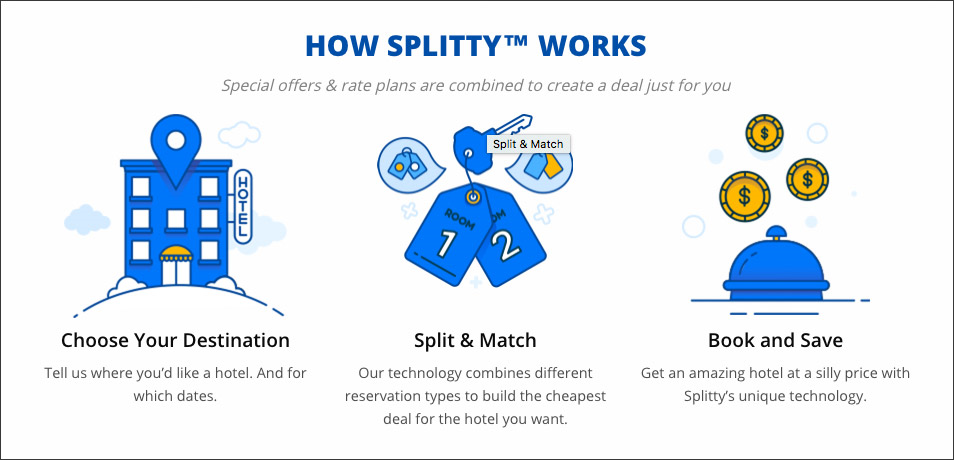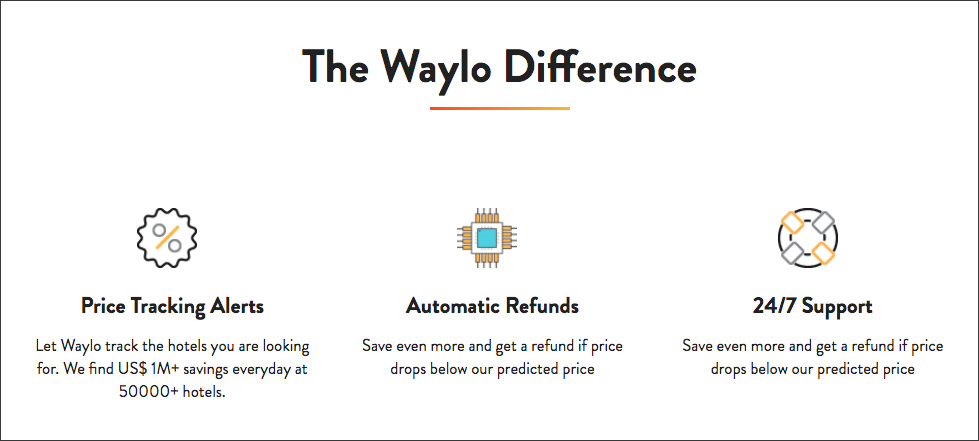
By Nancy Huang
Almost seven years since HotelTonight launched its tonight-only hotel booking app, the industry has been flooded with a host of ambitious startups looking to find similar success. At the recent PhocusWright Summit, almost half of the 24 startups presenting their ideas were related to hotel booking apps.
However, during a rapid 3-minute question round, potential investor Chris Hemmeter questioned the sustainability of one of the startup’s business models, raising concerns that it merely took advantage of industry loopholes.
In the following post, we’ll look at how some newer hotel booking apps are striving to find their own niche, weighing up whether their innovative booking models really do have long-term viability.
Splitty: Split rates and room types
Using machine learning through its “Split & Match” technology, Splitty enables travelers to get exclusive rates that are cheaper than both hotels and OTAs. For each hotel search, Splitty looks at millions of combinations of rates and room types within a hotel and then mixes and matches to find the cheapest combination.
The cost savings can work out to be pretty substantial, but is saving money worth the pain of potentially switching rooms during a stay? Splitty will almost certainly divide opinion here.
One of the main issues could arise from the fact that guests may have to check-in and check-out between room moves. Splitty’s FAQ section does state this shouldn’t happen in most cases, but this would clearly create added hassle that could put people off.
Broadly speaking, families with kids and older generations probably won’t see Splitty as an appealing cost-saving option. However, budget vacationers and younger travelers might find its proposition attractive enough to make a mid-stay room switch.
Waylo: Predict and secure lower hotel prices
Book a hotel room with up to 75% discount in just one text and three taps. That’s the big claim from California-based startup Waylo, which offers the same price tracking and predictive pricing model as airline counterpart, Hopper.
The idea is that hotel prices fluctuate like the stock market. Using its AI technology, Waylo predicts the future rates of hotels and alerts users when it thinks a price will drop. The hotel room can then be booked at that predicted price.
Waylo guarantees the booking and provides a refund if the price drops below the forecast price, effectively offering a risk-free booking experience. It’s currently available on Facebook Messenger, with a Slack bot and Alexa skill on the way.
It’ll be interesting to see how this early-stage startup develops. Waylo has already shown promise having won the PhocusWright startup battle. But even the company admits that it’s dangerous building your app on a platform like Facebook, citing Facebook’s lack of privacy and transparency over data usage as concerns, as well as Facebook’s tendency of switching up policies and platform features in ways that could upend current business models.
Bidroom: Closed user group discounts
In an attempt to capitalize on the dissatisfaction towards the OTA rate parity issue, Bidroom has created an entirely closed-group booking system. After paying a membership fee to join its booking community, Bidroom guarantees to find its members a better deal than the OTAs, with the promise of a potential savings of up to 25%.
This is actually one of the few apps that tries to work with hotels directly (Bidroom promises to take no commission). Skirting the commission model and attempting to work directly with hotels, particularly independents, is admirable. But it’s likely that a lot of travelers will balk at the annual $59 membership fee.
That said, frequent travelers may see the subscription fee as small change if the yearly savings on multiple bookings stack up. Bidroom’s biggest challenge will be getting access to enough hotel room inventory to appeal to potential users. The less options available on the platform, the less likely that travelers will want to pay the fee.
Nightly: Mix and match hotels
What would convince a traveler to leave their hotel mid-trip and hike across town to another property? Nighty.travel hopes a saving of up to 70% will prove a strong enough incentive.
How can bookers make these kind of savings? Nightly’s methods include combining hotels that are cheaper on the weekends with ones that are cheaper on weekdays. Alternatively, savings can be made if travelers leave a hotel when the price spikes and check-in at another property where the price has dropped.
It’s a bold idea for sure, but does it have a future as a business model?
Nightly’s website does a decent job of trying to sweeten up the obvious hassle of a mid-trip hotel switch, suggesting that staying at two different hotels offers the opportunity to experience different properties in potentially different parts of town. The possibility of getting an upgrade by switching is also promoted as an added perk.
But even with these added benefits, the general proposition seems limited to the super-flexible, price-conscious traveler. Asking travelers to switch rooms mid-stay (as per Splitty’s proposition) already feels like a stretch. It’s hard to imagine whether enough people will be willing to switch hotels mid-stay.
A model for success?
New startups have always tried to solve one pain point or another of travel booking. Yet when it comes to scaling, they end up running into issues. Take HotelTonight, one of the more successful booking apps. Even they have had to pivot from being a “last-minute” app to one offering bookings 100 days out.
Whether these new wave of apps are sustainable remains to be seen, but do keep an eye on the technology powering their models. Moving forward, it’s likely we’re going to see elements of that same technology being adapted into some of the bigger booking sites.






